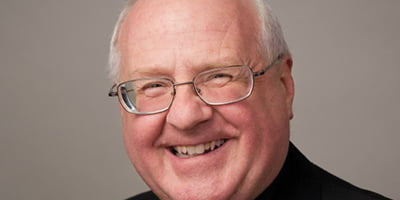
Father Mark Goldasich is the pastor of Sacred Heart parish in Tonganoxie. he has been editor of the Leaven since 1989.
by Father Mark Goldasich
Are you without wax?
That’s a colorful way of asking if you’re a sincere person. Although just a folk tale, it’s said that the word “sincere” comes from two Latin ones: sine, meaning “without,” and cera, “wax.” The story is that dishonest sculptors, when creating busts, would occasionally slip up and maybe chip off part of a statue’s nose. Rather than throw the whole thing out, these wily people would put some stone-or marble-colored wax on the statue to hold the nose in place. All looked great until the customer got his creation home and the summer’s heat or that of a candle would loosen that wax, causing the nose to drop off. As a result, customers began to ask upfront if their statue was “sine cera,” without wax. They wanted to be sure that what they were seeing was what was they were really getting. You’ve got to be just as careful about things today. Take, as an example, this cautionary tale:
A businessman needed some same-day dry cleaning before he left on a trip. He remembered one store with a huge sign — “One-Hour Dry Cleaners” — that he’d once passed on the other side of town. So, he drove way out of his way to drop off his suit.
After filling out the tag, he told the clerk, “I do need this in an hour.”
She replied, “I can’t get this back to you until Thurs- day.”
“But,” the guy sputtered, “your sign says you do dry cleaning in an hour.”
“Oh,” said the clerk with a laugh, “that’s just the name of this store.”
From this tale, Pastor Ed Rowell of Tennessee says the same confusion results from people who only bear the name of Christian, but don’t act like one. (Adapted from “Perfect Illustrations for Every Topic and Occasion,” by Craig Brian Larson and Drew Zahn.)
If most of us are honest with ourselves, we’ve all got some wax issues when it comes to being a Christian. It’s much easier to talk about our faith, study it or even pray about it than it is to live it. Lent is a time to clean up our act, to get rid of the wax and become the saintly people that the Lord has created us to be.
Someone who has always been an inspiration to me of both conversion and sincerity is Archbishop Oscar Romero. He was born in a small town in a remote part of El Salvador, Central America, in 1917. He was apprenticed to a carpenter at age 13 but, because he wanted to become a priest, entered the seminary a year later. He was eventually ordained a priest and named archbishop of San Salvador in 1977. The rich, ruling families of the country, who were guilty of grave injustices against the poor, welcomed his appointment. These families didn’t expect any trouble from this shy and rather conservative prelate.
However, Archbishop Romero underwent a pro- found conversion after the assassination of Father Rutilio Grande, a Jesuit priest who was an activist for the poor. Shaken by his friend’s murder, the archbishop could no longer overlook the sufferings of the poor and soon became “a voice for the voiceless.” His sermons against the mis- treatment of those trapped in poverty were broadcast on the radio, endearing him to these campesinos, who supported and inspired him.
At the same time, the archbishop began to get death threats, yet he refused to be silenced. Eventually, he was assassinated on March 24, 1980, while celebrating Mass in a chapel of the Carmelite Sisters’ cancer hospital where he lived.
Before his death, he said, “I rejoice, brothers and sisters, that our church is persecuted precisely for its preferential option for the poor and for seeking to become incarnate in the interests of the poor. . . . How sad it would be in a country where such horrible murders are being committed if there were no priests among the victims.”
Archbishop Romero not only called the church to be sincere, he practiced what he preached.
This Lent, let’s all ask God to at least clean the wax out of our ears, so that we may clearly hear his voice in the cries of the poor around us and become more sincere people: Christians in both name and deed.

